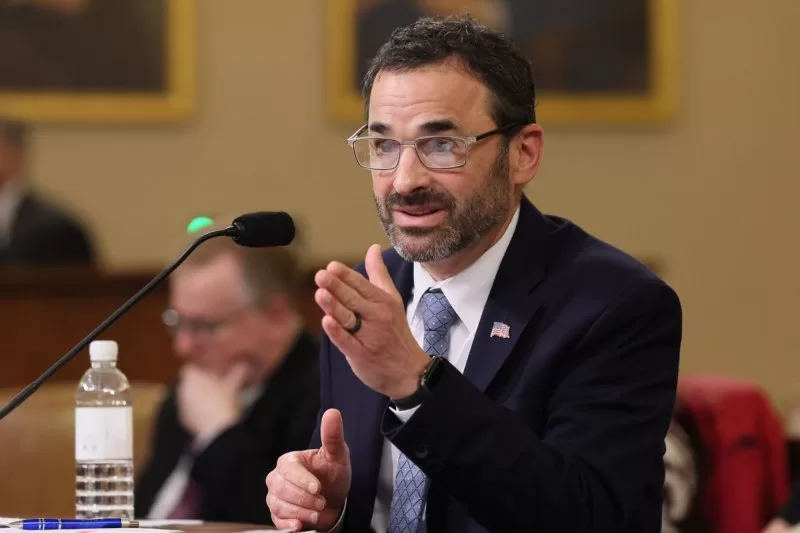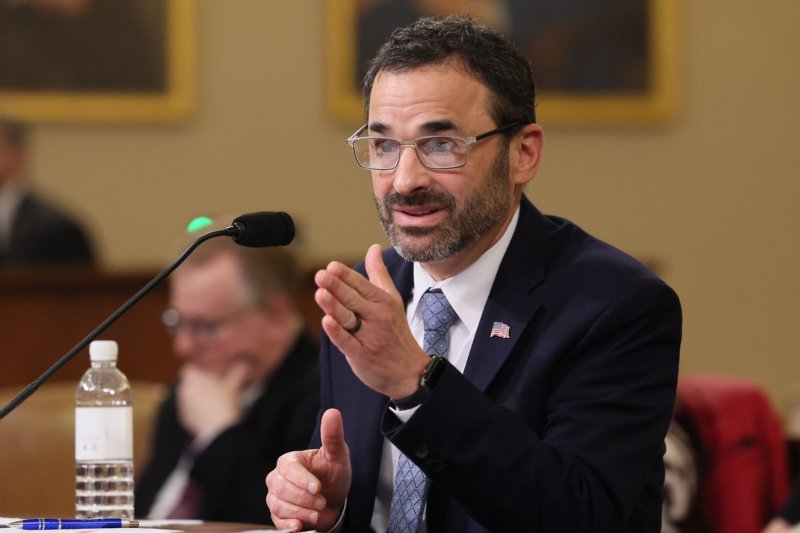1 of 5 | Internal Revenue Service Commissioner Daniel Werfel testifies during a House Ways and Means Committee hearing Thursday in Washington, D.C. House Republicans are seeking to claw back funding for the IRS provided in the Inflation Reduction Act. Photo by Jemal Countess/UPI |
License PhotoFeb. 15 (UPI) — IRS Commissioner Danny Werfel testified Thursday afternoon before the House Ways and Means Committee as the GOP-controlled chamber seeks to take money from the Inflation Reduction Act away from the IRS.
In the first bill passed under former Speaker Kevin McCarthy in January 2023, House Republicans voted to repeal funding for 87,000 new IRS agents. The funding in the Inflation Reduction Act provided $80 billion to the IRS over 10 years.
GOP Ways and Means Chair Jason Smith, R-Mo., called that funding a windfall for the IRS as he indicated he will question Werfel about how the money will be used.
In his opening statement about the hearing, Smith said, “We have serious questions about numerous other issues such as the implementation of an IRS direct file scheme that the American people didn’t ask for; how the IRS is spending its windfall of $80 billion; and fantasy-land claims about how much revenue the agency thinks it will generate from increased audits.”
Smith said Republicans have concerns about the Biden administration’s approach to the IRS and the tax agency’s handling of several important issues.
In his opening statement at the hearing, Werfel said the decision about whether to adequately fund the agency comes down to a fundamental choice of whether or not the IRS will have the resources to properly carry out its mission.
He said resources are needed that allow taxpayers to “easily interact with IRS to meet their tax responsibilities or resolve issues if they arise, to ensure fairness in the tax system through its enforcement activities, to quickly and effectively addresses tax scams that exploit vulnerable populations, and has updated IT infrastructure and modern technology platforms capable of supporting our transformation work.”
“As commissioner, I remain committed to leading the IRS’s transformation efforts in close collaboration with your committee, and I look forward to working with you to achieve a more modern and high-performing IRS, which will better serve taxpayers and our nation,” Werfel said.
In later testimony in the day, Werfel said that there are a couple of areas where artificial intelligence is being introduced into IRS operations.
“First in our call center, so that we are kind of using, for example, Chatbot so that when you’re asking a question before you get to a live assister they’re using language recognition to answer your question and then you resolve the question more quickly,” Werfel said.
He added that there’s very sophisticated AI modeling that uses advanced math that means the IRS is more likely to pull a case in which there’s possible evasion versus not.
“That means the honest taxpayer doesn’t get burdened and that means the dishonest taxpayer gets accountability,” Werfel testified.
Smith also criticized the IRS over the case of an IRS contractor sentenced to five years in prison for theft of taxpayer information.
“I think the Department of Justice woefully undercharged this individual, but I’m pleased the judge applied the maximum sentence available to her,” Smith said. “But this story doesn’t end with that case. The IRS must be accountable for allowing this theft to happen and must ensure that it fixes security vulnerabilities at the agency.”
Smith also raised the issue of what he described as IRS whistleblowers allegedly being retaliated against for charging that the DOJ gave preferential treatment to Hunter Biden.
During the hearing, Rep. Jimmy Gomez, D-Calif., criticized his Republican colleagues for letting vital provisions in the 2021 child tax credit expire.
“Ultimately Republicans refused to support the provisions that have been proven to dramatically reduce child poverty, provisions like increasing the maximum credit and ensuring full refundability to help kids of families who need the support the most,” he said.
When Gomez asked if the IRS has the infrastructure to roll out advanced CTC payments if Congress approves it, Werfel said the IRS now has the “muscle memory” to be able to implement such changes.
Werfel said, “The 2024 filing season is off to a strong start, and, assuming the agency receives adequate funding going forward, the future holds great promise for the agency and the taxpayers we serve.”

